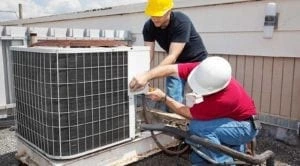
As a homeowner, there’s a lot to understand about the basics of the air conditioner and heater system in your home. When it comes to Colorado HVAC Systems, there are many common questions that new homeowners ask so that they can familiarize themselves with their systems. We’re going to cover some of these questions below to help you get better acquainted with your home’s heating and air conditioning system.
Probably one of the most confusing questions that homeowners have about their HVAC system is how often they should replace the air filter. Some places will tell you it needs to be replaced once a month, while others may say it only needs to be replaced every three months. The truth is that it really depends on the specific attributes of your home, like how many people live there, how many pets you have, and so forth.
It's a good rule of thumb to pull out your air filter once a month to see if it needs to be replaced. If you hold it up to a light source and you're no longer able to see through the filter, then it's time to replace it. You'll likely find that you need to replace your air filter more often during the summer months when it's getting utilized heavily.
It's important that your heating and air conditioning system be serviced before the start of the summer and winter seasons. This regular maintenance helps to ensure that your system is operating efficiently and that there are no foreseeable problems with your system that could result in a future breakdown. While it's completely possible to do regular maintenance on your home's HVAC system, it's necessary to bring in a professional like Doctor Fix It Plumbing, Heating, Cooling and Electric, in the spring and in the late fall to perform service.
Most Colorado HVAC manufacturers require that a professional service the system to keep your warranty active. Many times, if you only perform DIY maintenance, you can actually void the warranty on your system and you will end up paying more for future repairs out of pocket.
The answer to this question is that it truly depends on how you use it. A programmable thermostat allows you to program in set temperatures for different hours of the day and days of the week. In the summertime, you can help drastically reduce your energy bills by programming your thermostat to be at a higher temperature during the daytime hours when no one is at home. This way, your air conditioning system isn't running all day, creating cool air with no one there to enjoy it. The same concept holds true for the winter months with your heater.
Programmable thermostats basically allow you to take advantage of optimizing the temperature settings on your thermostat.
One area that many homeowners are confused about when it comes to household heating and cooling is a heat pump. A heat pump can be used to both heat and cool a home. It's called a heat pump because it transfers heat from inside to the outdoors or from the outdoors back to the indoors.
Every heat pump has a substance inside of its coils known as refrigerant. During the summer months, air from inside your home will be circulated over the evaporator coil, and heat will transfer into the refrigerant. The refrigerant is then pumped outside to the condenser coil, where heat is released from the refrigerant to the air outside. During the wintertime, this system works in reverse to bring heat from outside into your home.
A very popular type of heat pump on the market today is the ductless mini-split system. While these systems are very similar to a ducted HVAC system, they don't require ductwork. There are mini-split units placed inside various rooms throughout your home. They all connect to the outdoor compressor unit via copper piping, where the refrigerant flows.
With traditional ducted units, the air is pulled in through the ducting and forced over the evaporator coil and back into the rooms throughout your home. With a ductless system, the air is drawn into the wall-mounted unit and heated or cold right at the unit. This allows it to force air back out that is either heated or cold, depending on the specific settings that you have. Ductless mini-split units provide homeowners with the added benefit of zone control heating as compared to just setting one thermostat for your entire home.
HVAC zoning simply allows you to control the temperature of a specific room or area of your home independently from all the other areas. This means that you can set your living room temperature in the summertime to be a bit colder than other rooms throughout your home. With Colorado HVAC zoning, you can drastically work to reduce your energy bills since you can have more customized heating and cooling options throughout your help.
Do You Need Reliable HVAC Service in the Denver, Colorado Area?
Since 1978, we have been providing dependable home A/C and heating services in Denver. Call the HVAC experts at Doctor Fix It Plumbing, Heating, Cooling and Electric today at (303) 993-1550 to schedule your service appointment.













